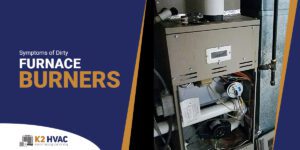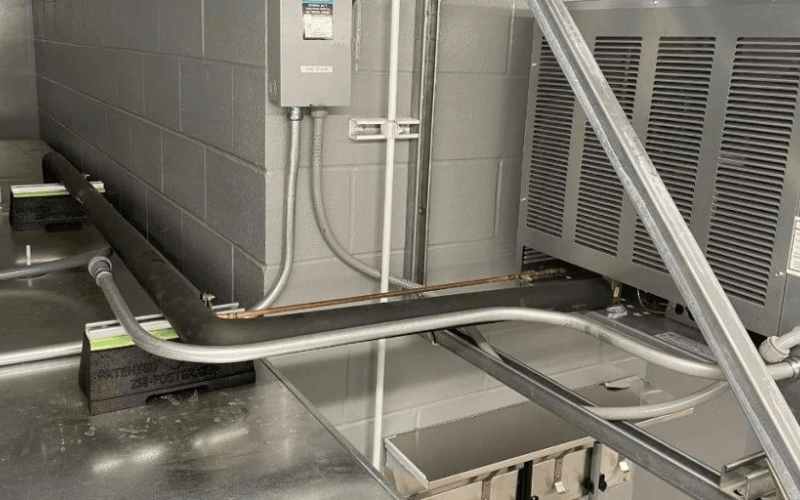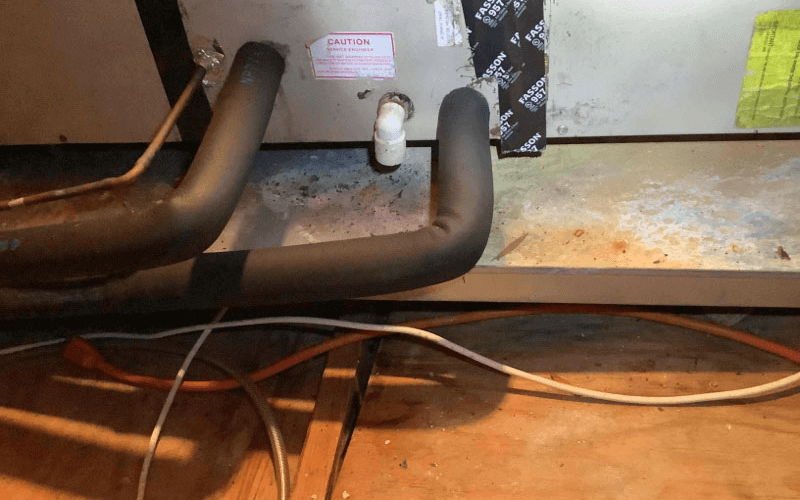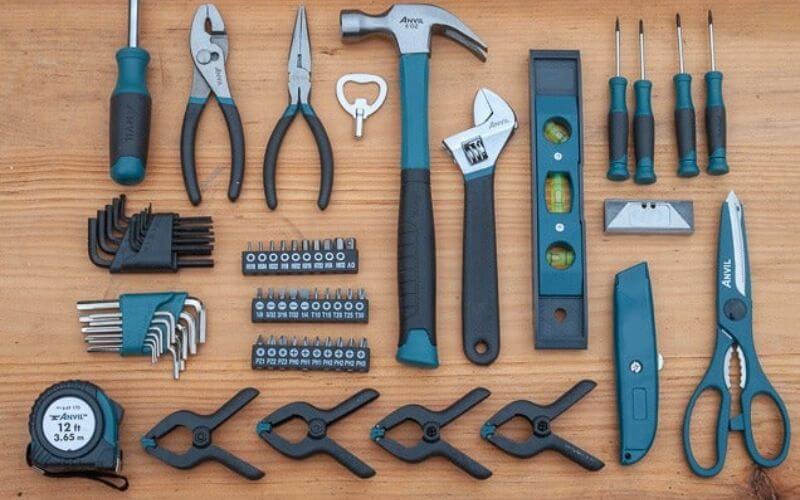Many factors can fail an HVAC system over time. Structure damage, worn parts, and components can irritate the air conditioner and cause it to malfunction. However, the frozen air conditioner itself is a common problem.
Now, you might be thinking why is my air conditioner freezing up outside?
Frozen outside units may be caused by many reasons like a refrigerant leak, drainage obstruction, outside temperature, and thermostat failure.
In this article, we’ll look at the various reasons for freezing and how to solve them. So continue reading.
Table of Contents
ToggleAlso check: AC Thermostat Keeps Resetting To 85—What to Do?

Why Does The Air Conditioner Outdoor Unit Freeze Up?
There could be several reasons for this:
- Leak of refrigerant
- Drainage obstruction
- Outside Temperature changes
- Clogged as a result of dirt on the filter
- Thermostat failure
When ice builds up in the air conditioner and fails to cool effectively, it strains the compressor. This stress can weaken the compressor (expensive repair) and wear out other internal components over time.
Freezing air conditioners can be hectic, especially when the weather warms up in the spring. The information below explains why the air conditioner freezes and what to do if it does.
Factors That Cause Air Conditioner Outdoor Units Freezing Up
Let’s look at the various factors contributing to air conditioner freezing.
Refrigerant Leakage (also Known As “coolant”)
The pressure and temperature changes are caused by air conditioner refrigerant. Evaporator coil leaks can cause the system to freeze completely. These leaks can also occur in the condenser coil due to U-bend holes or in the refrigerant tube due to freezing. If you keep adding new refrigerant to your air conditioner and it freezes, you will need to repair and refill the leak.
Drainage Blockage:
The condensate from the HVAC system will remain trapped and freeze over time due to the cooling process if proper drainage is not provided. The drain’s overall function is to direct water from the coil to the drain pan. Freezing the coil can cause ice to build up on the coil and shut down the system, resulting in severe freezing damage.
Temperature Changes Outside:
Air conditioners operate at specific temperatures and are typically inefficient below 60 degrees Fahrenheit. The night-time temperature may be too low for the air conditioner to function correctly, depending on the cold season and location. When the outside air is too cold, the pressure inside the air conditioner drops, causing icing. If your air conditioner freezes, turn it off and let it thaw.
Filter Clogged By Dirt Accumulation:
Clogged air filters are one of the most common causes of HVAC system failure. The accumulation of dirt and dust on the filter puts a strain on the system and obstructs airflow. Suppose the airflow in the air conditioner is restricted. In that case, the evaporator coil may freeze due to a lack of heat to absorb it. The air filter may need to be cleaned, repaired, and replaced to correct this.
Thermostat Malfunction:
Freezes can also occur due to sensor issues with the thermostat or the entire HVAC system. If the thermostat fails, the air conditioner may continue to run despite the current low temperatures. Continued operation may cause the air conditioning condenser coil to freeze, causing the entire system to shut down.
Troubleshoot:
If a thermostat fails, it can be recalibrated for proper operation or replaced if it cannot be repaired. Do not attempt to repair the freezer air conditioner on your own. You can take steps to avoid further damage and, in some cases, figure out what caused the freeze. Troubleshooting can help you save on diagnostic costs when consulting an HVAC specialist. Let us now examine them.
Turn Off The Power Of The Ac Unit:
Turn off the air conditioner if you notice frost on the unit or restricted airflow from vents around the house. Warm air will flow over the evaporator coil, allowing it to thaw if the air conditioner is frozen.
Examine The Filter:
As previously stated, a dirty filter reduces airflow over the coil. When the airflow is reduced, the coolant temperature drops below what is required, and frost forms quickly. If the system freezes and you suspect the filter is clogged, turn it off, replace it, wait at least 24 hours before restarting, and then continue.
Examine The Evaporator Coil’s, Drain Line:
When the drain line becomes clogged, moisture drawn from the air by the air conditioner cannot escape and freezes. Water will collect in the drain pan if the evaporator coil’s drain line becomes clogged. Remember that this could cause flooding in your home.
Open And Clean All Vents:
Closing the supply air vents reduces the air that blows into the room register, which has the same effect as the filter freezing due to dirt. Check that all ventilation holes are open and free of debris.
How Long Does The Air Conditioner Coil Take To Melt?
Defrosting the evaporator coil may take up to 24 hours. In many cases, you may be able to unzip the air conditioner yourself. Do not turn on the air conditioner if the evaporator coil appears frozen. The compressor is under strain and may fail. To begin the coil defrosting process, locate the electric fuse box and turn off the switch that controls the power to the AC unit.
We do not recommend attempting to remove the ice by hand because this can cause damage to the components. Once the coil and condenser have melted, remove any accumulated water around the unit.
Check The Reason And Solve It To Avoid Freezing Up Problems!
As you know, various factors can cause your air conditioner to freeze and shut down. It is acceptable to try and repair the problem on your own. However, to get the unit up and running quickly and safely, it is always a good idea to consult an experienced HVAC expert.
FAQs
Can you pour hot water on a frozen AC unit?
The response is “Yes.” Pouring hot water will cause the ice to melt more quickly, thawing your AC. Warm water or flowing water will also work to defrost the ice; really hot water is not necessary.
Will the frozen AC self-melt?
The ice should melt if the coils aren’t working. The ice should melt in about 24 hours, but it might take longer if your unit is completely encased in ice.
Also check: How To Connect Galvanized Pipe Without Threads
How long does it take for an outdoor air conditioner to defrost?
An AC unit typically needs between two and twenty-four hours to defrost properly. The size of the AC unit, the ambient temperature, and the amount of ice buildup already present all play a significant role in this.
How can an outdoor air conditioner be defrosted?
- First, deactivate the thermostat on your air conditioner.
- After that, switch the fan’s setting from “auto” to “on.”
- The system will progressively thaw, thanks to the fan.
- You can restart your air conditioner and set the fan to auto once the ice has been removed (This may take an hour or more).
Why would an outdoor air conditioner freeze up?
A dirty air filter is the main factor in HVAC systems that freeze. The air filter cleans your home’s circulating air. Throughout the summer, as your air conditioner runs, the filter collects debris, pollen, dust, and other allergens. The HVAC coils may freeze as a result of the airflow being restricted.
What should I do if an outside unit freezes?
The air conditioner must first be turned off so that it can defrost. Turn on the fan for about an hour after it has thawed sufficiently (1-3 hours). This is a good time to replace your air filter.





















